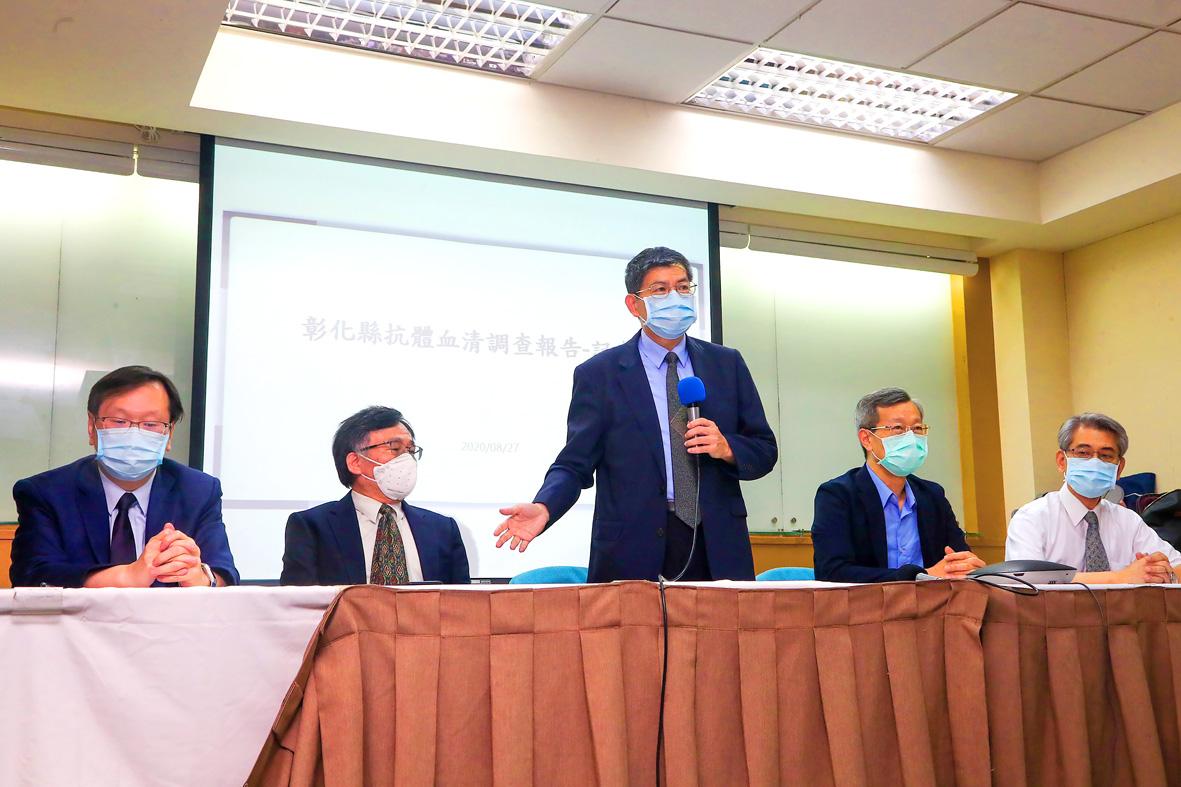The results of a controversial antibody study in Changhua County, which National Taiwan University (NTU) public health researchers announced yesterday, showed the success of the Central Epidemic Command Center’s (CECC) disease prevention efforts, but not the need for universal screening.
The research was mainly conducted by the county government, while NTU’s College of Public Health assisted with data analysis, former college dean Chan Chang-chuan (詹長權) told a news conference convened in Taipei to announce the preliminary results.
Chan had been calling for mass testing for COVID-19 to identify asymptomatic patients, but the CECC had not taken his advice.

Photo: CNA
Of the 4,841 high-risk people whose blood samples were analyzed, only four were confirmed positive, a rate of 8.3 positive people per 10,000, Changhua Public Health Bureau Director Yeh Yen-po (葉彥伯) said.
Those who were inspected included confirmed COVID-19 patients and those with high risk of becoming patients, including medical personnel, police officers who helped with disease prevention measures and those under home quarantine after returning from the US, Europe and China, he said.
The study demonstrates that the average citizen does not need an antibody test, Yeh said, adding that the test results prove that Changhua is safe.
Taiwan’s first COVID-19 patient, an unlicensed taxi driver who also became the nation’s first death from the pandemic, was in the county, but the rest of the nation does not need to worry now that Changhua is safe, he added.
Since April, the bureau has bumped heads with the CECC for conducting pathology testing not approved by the center.
An Aug. 15 test that discovered the nation’s 485th case — a Taiwanese teen living in the US who arrived on Aug. 5 for a family visit — was touted as proof that the nation needed to implement general screening for COVID-19, increasing tensions between the CECC and the county government.
At the news conference, Centers for Disease Control Deputy Director-General Chuang Jen-hsiang (莊人祥), the CECC’s spokesman, thanked the research team for announcing the results despite the challenges, saying that the research clarified whether the nation’s disease prevention system has any loopholes.
The results show that the CECC’s policy of using home quarantine and home isolation to prevent transmission of the virus by asymptomatic patients works, Chuang said.
Asked to comment on the results of the mass testing, Premier Su Tseng-chang (蘇貞昌) said it showed that the collaborative efforts of all parts of society to prevent the spread of the disease paid off.
It also showed that mass testing is unnecessary, he added.
Hopefully, people would learn their lesson and follow the CECC’s instructions, he said, adding that in disease prevention, unity is strength.
Regarding controversy surrounding the funding sources and testing agents for the research, Chan said that the school’s study was academic, as its contract with the county government said that it could provide assistance if public health evaluations were needed.
Their study had been approved by NTU’s Institutional Review Board, he added.
NTU provided the funding to purchase the antibody serum solutions and the research team helped analyze the serum samples, Chan said, adding that it did not collect any of the blood samples.
Additional reporting by Sean Lin, Wu Po-hsuanand Lin Hui-chin

SECURITY: As China is ‘reshaping’ Hong Kong’s population, Taiwan must raise the eligibility threshold for applications from Hong Kongers, Chiu Chui-cheng said When Hong Kong and Macau citizens apply for residency in Taiwan, it would be under a new category that includes a “national security observation period,” Mainland Affairs Council (MAC) Minister Chiu Chui-cheng (邱垂正) said yesterday. President William Lai (賴清德) on March 13 announced 17 strategies to counter China’s aggression toward Taiwan, including incorporating national security considerations into the review process for residency applications from Hong Kong and Macau citizens. The situation in Hong Kong is constantly changing, Chiu said to media yesterday on the sidelines of the Taipei Technology Run hosted by the Taipei Neihu Technology Park Development Association. With

CARROT AND STICK: While unrelenting in its military threats, China attracted nearly 40,000 Taiwanese to over 400 business events last year Nearly 40,000 Taiwanese last year joined industry events in China, such as conferences and trade fairs, supported by the Chinese government, a study showed yesterday, as Beijing ramps up a charm offensive toward Taipei alongside military pressure. China has long taken a carrot-and-stick approach to Taiwan, threatening it with the prospect of military action while reaching out to those it believes are amenable to Beijing’s point of view. Taiwanese security officials are wary of what they see as Beijing’s influence campaigns to sway public opinion after Taipei and Beijing gradually resumed travel links halted by the COVID-19 pandemic, but the scale of

A US Marine Corps regiment equipped with Naval Strike Missiles (NSM) is set to participate in the upcoming Balikatan 25 exercise in the Luzon Strait, marking the system’s first-ever deployment in the Philippines. US and Philippine officials have separately confirmed that the Navy Marine Expeditionary Ship Interdiction System (NMESIS) — the mobile launch platform for the Naval Strike Missile — would take part in the joint exercise. The missiles are being deployed to “a strategic first island chain chokepoint” in the waters between Taiwan proper and the Philippines, US-based Naval News reported. “The Luzon Strait and Bashi Channel represent a critical access

Pope Francis is be laid to rest on Saturday after lying in state for three days in St Peter’s Basilica, where the faithful are expected to flock to pay their respects to history’s first Latin American pontiff. The cardinals met yesterday in the Vatican’s synod hall to chart the next steps before a conclave begins to choose Francis’ successor, as condolences poured in from around the world. According to current norms, the conclave must begin between May 5 and 10. The cardinals set the funeral for Saturday at 10am in St Peter’s Square, to be celebrated by the dean of the College